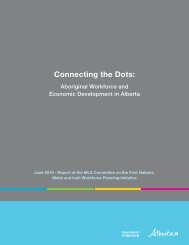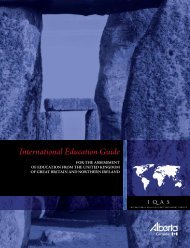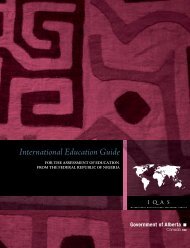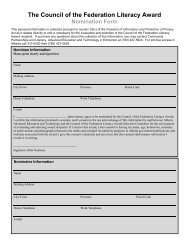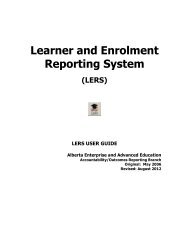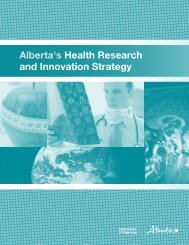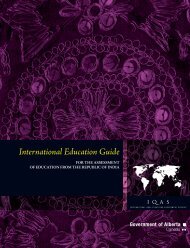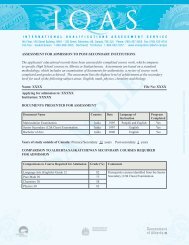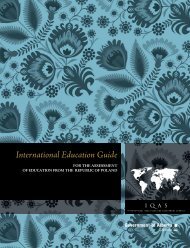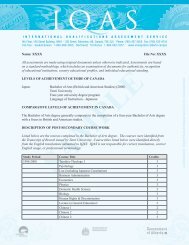International Education Guide - Enterprise and Advanced Education ...
International Education Guide - Enterprise and Advanced Education ...
International Education Guide - Enterprise and Advanced Education ...
Create successful ePaper yourself
Turn your PDF publications into a flip-book with our unique Google optimized e-Paper software.
.34<br />
INTERNATIONAL EDUCATION GUIDE for the assessment of education from the Islamic Republic of Pakistan<br />
study textbooks <strong>and</strong> audiovisual materials, <strong>and</strong> daily<br />
broadcasting of TV <strong>and</strong> radio programs<br />
• study centres offering guidance from part-time teachers<br />
(tutors), teaching practice for teacher education courses,<br />
<strong>and</strong> practical training for professional <strong>and</strong> technical<br />
courses<br />
• no age limit for student enrolment<br />
• option for students to proceed at their own pace from<br />
semester to semester<br />
• students in the workforce accounting for over 70 per<br />
cent of total enrolment<br />
• female students accounting for more than half of total<br />
enrolment<br />
Established in 2002, the Virtual University of Pakistan<br />
has a federal charter to offer certificate, diploma <strong>and</strong><br />
degree programs. Instruction is provided mainly through<br />
the distance learning mode (TV broadcast <strong>and</strong> the<br />
Internet), with over a hundred associated institutions<br />
providing infrastructure <strong>and</strong> support to the students.<br />
Student–teacher interaction, assignments <strong>and</strong> quizzes<br />
are mainly h<strong>and</strong>led over the Internet. Mid-term <strong>and</strong> final<br />
examinations are conducted at designated exam centres<br />
across the country. Major programs offered by the Virtual<br />
University include:<br />
• certificate courses with no entry requirement<br />
• one-year diplomas in computer science <strong>and</strong> technology,<br />
with entry based on achievement of Grade 12<br />
• two-year bachelor’s degrees (arts, commerce, science,<br />
business administration, <strong>and</strong> so on)<br />
• 130-credit Bachelor of Science degrees<br />
• 72-credit Master of Computer Science (MCS) degrees,<br />
Master of Information Technology (MIT) degrees <strong>and</strong><br />
Master of Business Administration (MBA) degrees<br />
• 30-credit Master of Science in Computer Science<br />
degrees, with entry based on possession of a four-year<br />
bachelor’s degree<br />
University Quality Indicators<br />
The rapid expansion of the higher education sector in<br />
recent years has raised serious concerns about quality <strong>and</strong><br />
st<strong>and</strong>ards in both public <strong>and</strong> private institutions. The<br />
number of public universities has almost doubled since<br />
2000, partly through upgrading colleges to university<br />
status. Some of those newly upgraded public universities<br />
lack facilities <strong>and</strong> qualified staff.<br />
Many private institutions are of questionable quality<br />
<strong>and</strong> not recognized by the government. However, even<br />
among the newly chartered private institutions, the quality<br />
<strong>and</strong> st<strong>and</strong>ards are fairly uneven. The Higher <strong>Education</strong><br />
Commission provides a list of the 57 private universities <strong>and</strong><br />
degree-awarding institutions in four categories.<br />
Another quality indicator for Pakistan universities is<br />
the HEC university ranking based on 2001–04 data on<br />
students, facilities, faculties, finance <strong>and</strong> research. The<br />
ranking only covers about half of the universities in the<br />
country, as many institutions—such as private institutions<br />
in categories Y <strong>and</strong> Z, institutions chartered after 2001 <strong>and</strong><br />
distance learning institutions—are excluded.<br />
Colleges<br />
UNIVERSITY QUALITY INDICATORS<br />
Category St<strong>and</strong>ard Achieved Number<br />
W Meets major requirements 22<br />
X<br />
With minor shortfalls, expected to<br />
meet criteria by 2007<br />
Y Does not meet requirements 2<br />
Z Seriously deficient 4<br />
Total Institutions Assessed 57<br />
Like universities, colleges in Pakistan can also be classified<br />
in various ways. A major distinction exists between<br />
constituent colleges <strong>and</strong> affiliated colleges. Constituent<br />
colleges (also called university colleges or campuses) are<br />
directly administered by the university <strong>and</strong> offer both<br />
undergraduate <strong>and</strong> graduate programs. The majority of<br />
colleges, called either colleges or institutes, are affiliated<br />
colleges. The affiliating university sets the syllabi, conducts<br />
major examinations <strong>and</strong> awards degrees, while teaching is<br />
undertaken at the affiliated colleges. Most affiliated colleges<br />
only teach at the undergraduate level, <strong>and</strong> some offer only<br />
bachelor’s (pass) programs. The practice of offering higher<br />
secondary or intermediate education at colleges is being<br />
phased out.<br />
The majority of the affiliated colleges are public, <strong>and</strong> their<br />
teachers <strong>and</strong> staff are government employees. A small<br />
number of affiliated colleges are private.<br />
29




